Acoustic Insulation for Commercial Applications
Introduction
In various commercial settings, from bustling offices to vibrant restaurants and shopping malls, excessive noise poses significant challenges, disrupting productivity, creating unpleasant atmospheres, and impacting the well-being of both employees and customers. Acoustic insulation emerges as a crucial solution to address these issues.
This article focuses on the importance of acoustic insulation for commercial applications by examining the various materials that can be used, soundproofing techniques implemented, and the benefits experienced. By exploring these topics, businesses can better understand the role that Acoustic Insulation plays in fostering comfort, productivity, and overall positive experiences within their spaces.
Understanding Acoustic Insulation for Commercial Applications
1. What is Acoustic Insulation?


Acoustic insulation is a crucial aspect of creating optimal sound environments in commercial spaces. This specialized insulation method focuses on minimizing the transmission of sound waves, ensuring a quieter and more comfortable atmosphere. By employing materials designed to absorb, block, or dampen sound, acoustic insulation serves as a barrier against unwanted noise, enhancing the overall acoustic treatment within commercial settings.
In the realm of commercial applications, where ambient noise levels can significantly impact productivity and customer experience, the implementation of effective acoustic insulation becomes paramount. From offices and conference rooms to restaurants and entertainment venues, the demand for solutions that foster a quieter and more conducive environment is on the rise. Acoustic Insulation for Commercial Applications addresses this need by providing tailored solutions that strike a balance between functionality and aesthetics, creating spaces where sound is controlled and harmonious.
2. Types of Acoustic Insulation for Commercial Applications
a. Fiber glass wool ceiling tiles and panels
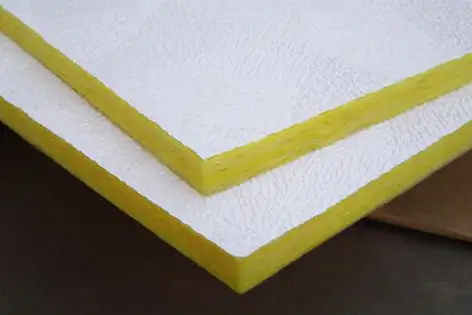
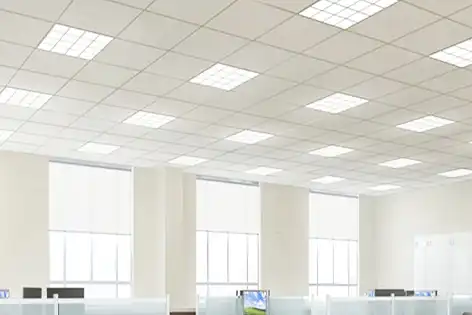
Fiber glass wool ceiling tiles and panels are a versatile and widely used material in the realm of acoustic insulation for commercial applications. Composed of fine glass fibers, these panels effectively absorb sound waves, preventing their transmission and reducing overall noise levels within a space. Ideal for environments such as offices and conference rooms, fiberglass panels strike a balance between functionality and aesthetics. Their lightweight nature allows for easy installation on walls and ceilings, seamlessly integrating with the design while providing efficient acoustic insulation for commercial applications.
b. Mineral Wool Insulation


Mineral wool insulation is a robust solution for acoustic insulation in commercial settings. Crafted from natural or synthetic minerals like rock or slag, this material boasts excellent sound-absorbing properties. When strategically placed within dry wall partition walls and false ceilings, mineral wool effectively traps and dampens sound waves, creating a quieter and more comfortable atmosphere. Acoustic Insulation for Commercial Applications benefits significantly from the versatility and fire-resistant qualities of mineral wool, making it an ideal choice for structures where safety and sound control are paramount, such as meeting rooms, conference rooms, open office spaces etc.
c. Acoustic Ceiling Tiles:

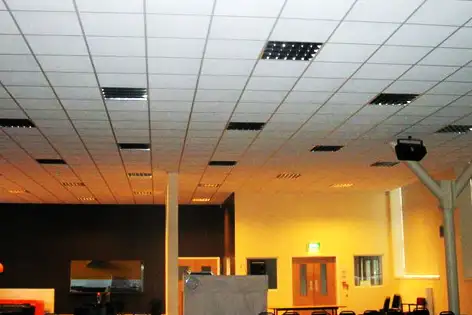
Acoustic ceiling tiles are a practical and visually appealing solution for commercial spaces aiming to enhance sound quality. These tiles, typically made from materials like mineral fiber or foam, are designed to absorb and diffuse sound waves, reducing echoes and minimizing noise. With a wide range of designs and textures available, acoustic ceiling tiles contribute not only to the functionality of a space but also to its aesthetic appeal. In environments like restaurants and retail spaces, where customer experience is crucial, the integration of acoustic ceiling tiles becomes integral to the success of Acoustic Insulation for Commercial Applications.
d. Fabric Wall Coverings
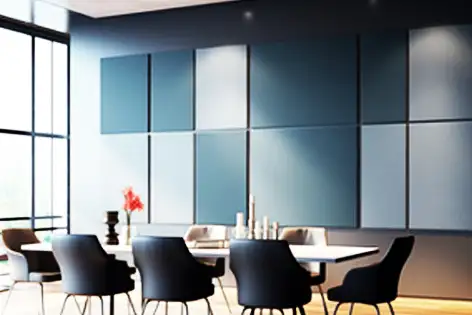
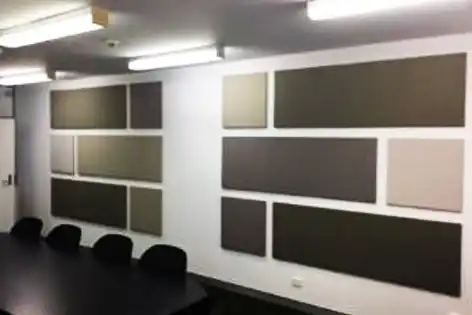
Fabric wall coverings or fabric acoustic wall panels are an elegant and effective choice for acoustic insulation in commercial applications. Designed with acoustic properties in mind, these panels consist of specially engineered acoustic material such as wood wool board which are wrapped with fabric that absorb sound waves, preventing reverberation and echo. Beyond their acoustic benefits, fabric wall coverings contribute to the overall aesthetics of a space, offering a customizable and visually pleasing solution. Whether used in hotel lobbies or upscale offices, the incorporation of fabric wall coverings aligns seamlessly with the objectives of Acoustic Insulation for Commercial Applications, creating refined environments with superior sound control.
e. Acoustic Foam Panels:
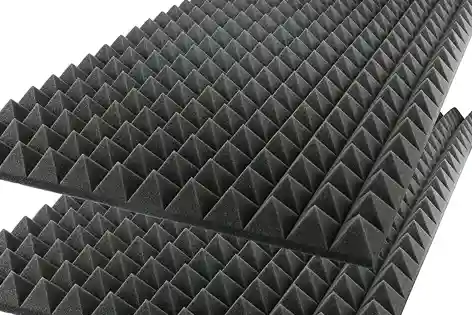

Acoustic foam panels represent a cutting-edge solution in the pursuit of optimal sound control within commercial spaces. Composed of open-cell polyurethane foam, these Pu Foam Acoustic panels are designed to trap and absorb sound waves, minimizing noise and preventing its transmission. The lightweight and easily installable nature of acoustic foam panels makes them a practical choice for environments such as recording studios, where precision in sound control is important. With their ability to enhance both acoustics and aesthetics, acoustic foam panels are a key player in achieving the goals of Acoustic Insulation for Commercial Applications.
f. Baffles and Clouds


Baffles and clouds offer a unique and effective approach to acoustic insulation in large commercial spaces. Suspended from ceilings, these hanging elements, often made of materials like Fabric, PET Polyester Acoustic Panels or fiberglass, serve to absorb sound and reduce noise levels. Particularly beneficial in open-plan offices or expansive retail areas, baffles and clouds contribute to the overall success of Acoustic Insulation for Commercial Applications by providing targeted sound control. Their adaptable designs and customizable options make them a valuable addition to spaces where both functionality and aesthetics are essential, creating environments that prioritize comfort and productivity.
3. Benefits of Acoustic Insulation for Commercial Applications
a. Enhanced Productivity and Concentration:
Implementing acoustic insulation for commercial applications contributes significantly to enhanced productivity and concentration in the workplace. By minimizing ambient noise levels and vibration control through strategic use of insulation materials, employees can focus better on their tasks without being distracted by external sounds. This benefit is particularly crucial in office settings where concentration is key. Acoustic Insulation for Commercial Applications ensures that employees can work in a quieter environment, fostering a more productive and focused atmosphere conducive to efficient work.
b. Improved Customer Experience:
Acoustic insulation in commercial spaces directly impacts the customer experience, especially in sectors such as hospitality and retail. Restaurants, hotels, and retail establishments benefit from reduced background noise, creating a more pleasant and comfortable environment for patrons. Customers can engage in conversations without being hindered by excessive noise, leading to a more enjoyable and positive experience. In this context, Acoustic Insulation for Commercial Applications becomes a key element in shaping the overall ambiance and customer satisfaction within these establishments.
c. Compliance with Regulatory Standards:
Acoustic insulation in commercial applications ensures compliance with regulatory standards regarding noise pollution. Many jurisdictions have specific regulations governing acceptable noise levels in public spaces and workplaces. By investing in acoustic insulation measures, businesses proactively adhere to these standards, avoiding potential legal issues and penalties. Whether it’s a bustling office or a vibrant entertainment venue, maintaining a noise level within permissible limits is crucial. Acoustic Insulation for Commercial Applications not only creates a more comfortable environment but also aligns businesses with regulatory requirements, safeguarding them from potential legal complications.
d. Protection of Confidentiality and Privacy:
Acoustic insulation safeguards confidentiality and privacy in commercial settings where sensitive information is often discussed. In offices, conference rooms, or healthcare facilities, conversations must remain private to maintain professionalism and uphold client confidentiality. Properly implemented Acoustic Insulation for Commercial Applications ensures that sound is contained within designated areas, preventing confidential discussions from being overheard. This benefit is particularly crucial in legal practices, healthcare facilities, and corporate boardrooms, where maintaining privacy is paramount to business integrity and client trust.
e. Health and Well-being of Occupants:
Acoustic insulation positively impacts the health and well-being of individuals occupying commercial spaces. Prolonged exposure to high levels of noise can lead to stress, fatigue, and even long-term health issues. By incorporating acoustic insulation measures, businesses prioritize the physical and mental health of their employees and customers. Creating quieter environments in offices, healthcare facilities, and educational institutions contributes to a more comfortable and stress-free experience. Acoustic Insulation for Commercial Applications aligns with a holistic approach to occupant well-being, fostering environments that support both physical and mental health.
f. Enhanced Productivity and Concentration:
Acoustic insulation allows businesses to optimize their acoustic branding in commercial spaces. Establishments such as theaters, concert halls, and entertainment venues benefit from a controlled acoustic environment that enhances the overall auditory experience. By investing in high-quality insulation materials and design, businesses can shape their unique acoustic signature, distinguishing themselves in the market. Acoustic Insulation for Commercial Applications not only improves sound quality but also becomes an integral part of a brand’s identity, contributing to a memorable and distinctive customer experience. This optimized acoustic branding can set businesses apart in competitive markets and leave a lasting impression on customers.
Conclusion
In summary, Acoustic Insulation is instrumental in shaping functional and aesthetically pleasing spaces. The careful selection of materials, such as fiberglass panels and acoustic ceiling tiles, provides tangible benefits, from enhancing productivity and customer experiences to ensuring regulatory compliance. Beyond technical considerations, acoustic insulation reflects a commitment to occupant well-being and the creation of environments that balance functionality with aesthetics.
Businesses that prioritize sound control not only reap rewards in terms of efficiency and customer satisfaction but also establish a unique acoustic branding in entertainment venues. In essence, Acoustic Insulation for Commercial Applications is a cornerstone in the design and management of contemporary commercial spaces, fostering a harmonious and productive environment for all.
FAQs (Frequently Asked Questions)
Question: How does acoustic insulation contribute to enhanced productivity in commercial spaces?
Answer: Acoustic insulation enhances productivity by minimizing distracting noise in commercial environments. In offices, for example, materials like fiberglass panels absorb sound, creating a quieter atmosphere conducive to focused work. Reduced background noise means fewer interruptions, allowing employees to concentrate better on tasks. Acoustic Insulation transforms workplaces into more efficient and productive settings, supporting a work environment where individuals can perform at their best without the hindrance of excessive noise.
Question: Can acoustic insulation really improve the customer experience in restaurants and retail spaces?
Answer: Absolutely. Acoustic insulation in commercial spaces, such as restaurants and retail establishments, significantly improves the customer experience. For instance, the use of acoustic ceiling tiles helps to control noise levels, creating a more pleasant atmosphere for patrons. Customers can enjoy conversations without straining to hear over background noise. Acoustic Insulation plays a crucial role in shaping the ambiance of these spaces, ensuring that customers have an enjoyable and memorable experience without the discomfort of excessive noise.
Question: Is acoustic insulation essential for protecting confidentiality in professional environments?
Answer: Absolutely. Acoustic insulation is crucial for protecting confidentiality in professional settings. For instance, in offices and conference rooms, the use of sound-absorbing materials such as fabric wall coverings ensures that sensitive discussions remain private. Acoustic Insulation prevents sound from traveling beyond designated areas, safeguarding confidential conversations. This benefit is particularly vital in legal practices, healthcare facilities, and corporate boardrooms, where maintaining privacy is integral to the integrity of business operations.
Question: How does acoustic insulation contribute to regulatory compliance in commercial settings?
Answer: Acoustic insulation ensures regulatory compliance by maintaining acceptable noise levels in commercial spaces. Different jurisdictions have specific standards for noise pollution, and businesses must adhere to these regulations. Materials like mineral wool insulation effectively absorb sound, preventing it from exceeding permissible limits. By investing in Acoustic Insulation, businesses not only create a more comfortable environment but also proactively comply with regulatory standards, avoiding potential legal complications associated with excessive noise levels.
Question: How does acoustic insulation contribute to the health and well-being of occupants in commercial spaces?
Answer: Acoustic insulation positively impacts the health and well-being of occupants by reducing stress and fatigue associated with prolonged exposure to high noise levels. In environments like offices and educational institutions, acoustic foam panels effectively absorb sound, creating a more comfortable and stress-free experience. Acoustic Insulation for Commercial Applications aligns with a holistic approach to occupant well-being, fostering environments that support both physical and mental health. By creating quieter and more comfortable spaces, businesses contribute to a positive and healthy experience for employees and customers alike.
About the Author
Address
#6, 10th B Cross, Jayswal Center, KHB Main Road, Kaveri Nagar, Kanakanagar, RT Nagar Post, Bangalore – 560032
Mobile Number
+919008400702
+919945034989
Email Address
anil@jayswalgroup.com
sales@jayswalgroup.com